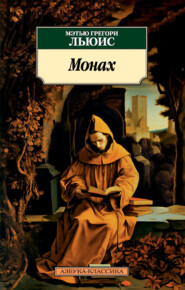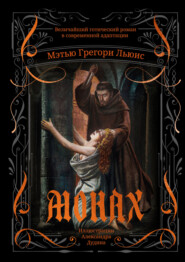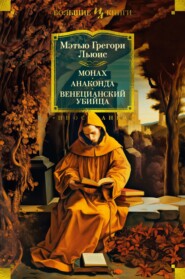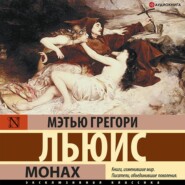По всем вопросам обращайтесь на: info@litportal.ru
(©) 2003-2025.
✖
The Monk
Настройки чтения
Размер шрифта
Высота строк
Поля
'You are determined, so am I: The Moment that you leave me, I plunge this Steel in my heart.'
'Holy St. Francis! Matilda, have you your senses? Do you know the consequences of your action? That Suicide is the greatest of crimes? That you destroy your Soul? That you lose your claim to salvation? That you prepare for yourself everlasting torments?'
'I care not! I care not!' She replied passionately; 'Either your hand guides me to Paradise, or my own dooms me to perdition! Speak to me, Ambrosio! Tell me that you will conceal my story, that I shall remain your Friend and your Companion, or this poignard drinks my blood!'
As She uttered these last words, She lifted her arm, and made a motion as if to stab herself. The Friar's eyes followed with dread the course of the dagger. She had torn open her habit, and her bosom was half exposed. The weapon's point rested upon her left breast: And Oh! that was such a breast! The Moonbeams darting full upon it enabled the Monk to observe its dazzling whiteness. His eye dwelt with insatiable avidity upon the beauteous Orb. A sensation till then unknown filled his heart with a mixture of anxiety and delight: A raging fire shot through every limb; The blood boiled in his veins, and a thousand wild wishes bewildered his imagination.
'Hold!' He cried in an hurried faultering voice; 'I can resist no longer! Stay, then, Enchantress; Stay for my destruction!'
He said, and rushing from the place, hastened towards the Monastery: He regained his Cell and threw himself upon his Couch, distracted irresolute and confused.
He found it impossible for some time to arrange his ideas. The scene in which He had been engaged had excited such a variety of sentiments in his bosom, that He was incapable of deciding which was predominant. He was irresolute what conduct He ought to hold with the disturber of his repose. He was conscious that prudence, religion, and propriety necessitated his obliging her to quit the Abbey: But on the other hand such powerful reasons authorized her stay that He was but too much inclined to consent to her remaining. He could not avoid being flattered by Matilda's declaration, and at reflecting that He had unconsciously vanquished an heart which had resisted the attacks of Spain's noblest Cavaliers: The manner in which He had gained her affections was also the most satisfactory to his vanity: He remembered the many happy hours which He had passed in Rosario's society, and dreaded that void in his heart which parting with him would occasion. Besides all this, He considered, that as Matilda was wealthy, her favour might be of essential benefit to the Abbey.
'And what do I risque,' said He to himself, 'by authorizing her stay? May I not safely credit her assertions? Will it not be easy for me to forget her sex, and still consider her as my Friend and my disciple? Surely her love is as pure as She describes. Had it been the offspring of mere licentiousness, would She so long have concealed it in her own bosom? Would She not have employed some means to procure its gratification? She has done quite the contrary: She strove to keep me in ignorance of her sex; and nothing but the fear of detection, and my instances, would have compelled her to reveal the secret. She has observed the duties of religion not less strictly than myself. She has made no attempts to rouze my slumbering passions, nor has She ever conversed with me till this night on the subject of Love. Had She been desirous to gain my affections, not my esteem, She would not have concealed from me her charms so carefully: At this very moment I have never seen her face: Yet certainly that face must be lovely, and her person beautiful, to judge by her … by what I have seen.'
As this last idea passed through his imagination, a blush spread itself over his cheek. Alarmed at the sentiments which He was indulging, He betook himself to prayer; He started from his Couch, knelt before the beautiful Madona, and entreated her assistance in stifling such culpable emotions. He then returned to his Bed, and resigned himself to slumber.
He awoke, heated and unrefreshed. During his sleep his inflamed imagination had presented him with none but the most voluptuous objects. Matilda stood before him in his dreams, and his eyes again dwelt upon her naked breast. She repeated her protestations of eternal love, threw her arms round his neck, and loaded him with kisses: He returned them; He clasped her passionately to his bosom, and … the vision was dissolved. Sometimes his dreams presented the image of his favourite Madona, and He fancied that He was kneeling before her: As He offered up his vows to her, the eyes of the Figure seemed to beam on him with inexpressible sweetness. He pressed his lips to hers, and found them warm: The animated form started from the Canvas, embraced him affectionately, and his senses were unable to support delight so exquisite. Such were the scenes, on which his thoughts were employed while sleeping: His unsatisfied Desires placed before him the most lustful and provoking Images, and he rioted in joys till then unknown to him.
He started from his Couch, filled with confusion at the remembrance of his dreams. Scarcely was He less ashamed, when He reflected on his reasons of the former night which induced him to authorize Matilda's stay. The cloud was now dissipated which had obscured his judgment: He shuddered when He beheld his arguments blazoned in their proper colours, and found that He had been a slave to flattery, to avarice, and self-love. If in one hour's conversation Matilda had produced a change so remarkable in his sentiments, what had He not to dread from her remaining in the Abbey? Become sensible of his danger, awakened from his dream of confidence, He resolved to insist on her departing without delay. He began to feel that He was not proof against temptation; and that however Matilda might restrain herself within the bounds of modesty, He was unable to contend with those passions, from which He falsely thought himself exempted.
'Agnes! Agnes!' He exclaimed, while reflecting on his embarrassments, 'I already feel thy curse!'
He quitted his Cell, determined upon dismissing the feigned Rosario. He appeared at Matins; But his thoughts were absent, and He paid them but little attention. His heart and brain were both of them filled with worldly objects, and He prayed without devotion. The service over, He descended into the Garden. He bent his steps towards the same spot where, on the preceding night, He had made this embarrassing discovery. He doubted not but that Matilda would seek him there: He was not deceived. She soon entered the Hermitage, and approached the Monk with a timid air. After a few minutes during which both were silent, She appeared as if on the point of speaking; But the Abbot, who during this time had been summoning up all his resolution, hastily interrupted her. Though still unconscious how extensive was its influence, He dreaded the melodious seduction of her voice.
'Seat yourself by my side, Matilda,' said He, assuming a look of firmness, though carefully avoiding the least mixture of severity; 'Listen to me patiently, and believe, that in what I shall say, I am not more influenced by my own interest than by yours: Believe, that I feel for you the warmest friendship, the truest compassion, and that you cannot feel more grieved than I do, when I declare to you that we must never meet again.'
'Ambrosio!' She cried, in a voice at once expressive of surprise and sorrow.
'Be calm, my Friend! My Rosario! Still let me call you by that name so dear to me! Our separation is unavoidable; I blush to own, how sensibly it affects me.– But yet it must be so. I feel myself incapable of treating you with indifference, and that very conviction obliges me to insist upon your departure. Matilda, you must stay here no longer.'
'Oh! where shall I now seek for probity? Disgusted with a perfidious world, in what happy region does Truth conceal herself? Father, I hoped that She resided here; I thought that your bosom had been her favourite shrine. And you too prove false? Oh God! And you too can betray me?'
'Matilda!'
'Yes, Father, Yes! 'Tis with justice that I reproach you. Oh! where are your promises? My Noviciate is not expired, and yet will you compell me to quit the Monastery? Can you have the heart to drive me from you? And have I not received your solemn oath to the contrary?'
'I will not compell you to quit the Monastery: You have received my solemn oath to the contrary. But yet when I throw myself upon your generosity, when I declare to you the embarrassments in which your presence involves me, will you not release me from that oath? Reflect upon the danger of a discovery, upon the opprobrium in which such an event would plunge me: Reflect that my honour and reputation are at stake, and that my peace of mind depends on your compliance. As yet my heart is free; I shall separate from you with regret, but not with despair. Stay here, and a few weeks will sacrifice my happiness on the altar of your charms. You are but too interesting, too amiable! I should love you, I should doat on you! My bosom would become the prey of desires which Honour and my profession forbid me to gratify. If I resisted them, the impetuosity of my wishes unsatisfied would drive me to madness: If I yielded to the temptation, I should sacrifice to one moment of guilty pleasure my reputation in this world, my salvation in the next. To you then I fly for defence against myself. Preserve me from losing the reward of thirty years of sufferings! Preserve me from becoming the Victim of Remorse! YOUR heart has already felt the anguish of hopeless love; Oh! then if you really value me, spare mine that anguish! Give me back my promise; Fly from these walls. Go, and you bear with you my warmest prayers for your happiness, my friendship, my esteem and admiration: Stay, and you become to me the source of danger, of sufferings, of despair! Answer me, Matilda; What is your resolve?'—She was silent—'Will you not speak, Matilda? Will you not name your choice?'
'Cruel! Cruel!' She exclaimed, wringing her hands in agony; 'You know too well that you offer me no choice! You know too well that I can have no will but yours!'
'I was not then deceived! Matilda's generosity equals my expectations.'
'Yes; I will prove the truth of my affection by submitting to a decree which cuts me to the very heart. Take back your promise. I will quit the Monastery this very day. I have a Relation, Abbess of a Covent in Estramadura: To her will I bend my steps, and shut myself from the world for ever. Yet tell me, Father, shall I bear your good wishes with me to my solitude? Will you sometimes abstract your attention from heavenly objects to bestow a thought upon me?'
'Ah! Matilda, I fear that I shall think on you but too often for my repose!'
'Then I have nothing more to wish for, save that we may meet in heaven. Farewell, my Friend! my Ambrosio!– And yet methinks, I would fain bear with me some token of your regard!'
'What shall I give you?'
'Something.—Any thing.—One of those flowers will be sufficient.' (Here She pointed to a bush of Roses, planted at the door of the Grotto.) 'I will hide it in my bosom, and when I am dead, the Nuns shall find it withered upon my heart.'
The Friar was unable to reply: With slow steps, and a soul heavy with affliction, He quitted the Hermitage. He approached the Bush, and stooped to pluck one of the Roses. Suddenly He uttered a piercing cry, started back hastily, and let the flower, which He already held, fall from his hand. Matilda heard the shriek, and flew anxiously towards him.
'What is the matter?' She cried; 'Answer me, for God's sake! What has happened?'
'I have received my death!' He replied in a faint voice; 'Concealed among the Roses … A Serpent....'
Here the pain of his wound became so exquisite, that Nature was unable to bear it: His senses abandoned him, and He sank inanimate into Matilda's arms.
Her distress was beyond the power of description. She rent her hair, beat her bosom, and not daring to quit Ambrosio, endeavoured by loud cries to summon the Monks to her assistance. She at length succeeded. Alarmed by her shrieks, Several of the Brothers hastened to the spot, and the Superior was conveyed back to the Abbey. He was immediately put to bed, and the Monk who officiated as Surgeon to the Fraternity prepared to examine the wound. By this time Ambrosio's hand had swelled to an extraordinary size; The remedies which had been administered to him, 'tis true, restored him to life, but not to his senses; He raved in all the horrors of delirium, foamed at the mouth, and four of the strongest Monks were scarcely able to hold him in his bed.
Father Pablos, such was the Surgeon's name, hastened to examine the wounded hand. The Monks surrounded the Bed, anxiously waiting for the decision: Among these the feigned Rosario appeared not the most insensible to the Friar's calamity. He gazed upon the Sufferer with inexpressible anguish; and the groans which every moment escaped from his bosom sufficiently betrayed the violence of his affliction.
Father Pablos probed the wound. As He drew out his Lancet, its point was tinged with a greenish hue. He shook his head mournfully, and quitted the bedside.
''Tis as I feared!' said He; 'There is no hope.'
'No hope?' exclaimed the Monks with one voice; 'Say you, no hope?'
'From the sudden effects, I suspected that the Abbot was stung by a Cientipedoro: The venom which you see upon my Lancet confirms my idea: He cannot live three days.'
'And can no possible remedy be found?' enquired Rosario.
'Without extracting the poison, He cannot recover; and how to extract it is to me still a secret. All that I can do is to apply such herbs to the wound as will relieve the anguish: The Patient will be restored to his senses; But the venom will corrupt the whole mass of his blood, and in three days He will exist no longer.'
Excessive was the universal grief at hearing this decision. Pablos, as He had promised, dressed the wound, and then retired, followed by his Companions: Rosario alone remained in the Cell, the Abbot at his urgent entreaty having been committed to his care. Ambrosio's strength worn out by the violence of his exertions, He had by this time fallen into a profound sleep. So totally was He overcome by weariness, that He scarcely gave any signs of life; He was still in this situation, when the Monks returned to enquire whether any change had taken place. Pablos loosened the bandage which concealed the wound, more from a principle of curiosity than from indulging the hope of discovering any favourable symptoms. What was his astonishment at finding, that the inflammation had totally subsided! He probed the hand; His Lancet came out pure and unsullied; No traces of the venom were perceptible; and had not the orifice still been visible, Pablos might have doubted that there had ever been a wound.
He communicated this intelligence to his Brethren; their delight was only equalled by their surprize. From the latter sentiment, however, they were soon released by explaining the circumstance according to their own ideas: They were perfectly convinced that their Superior was a Saint, and thought, that nothing could be more natural than for St. Francis to have operated a miracle in his favour. This opinion was adopted unanimously: They declared it so loudly, and vociferated,—'A miracle! a miracle!'—with such fervour, that they soon interrupted Ambrosio's slumbers.
The Monks immediately crowded round his Bed, and expressed their satisfaction at his wonderful recovery. He was perfectly in his senses, and free from every complaint except feeling weak and languid. Pablos gave him a strengthening medicine, and advised his keeping his bed for the two succeeding days: He then retired, having desired his Patient not to exhaust himself by conversation, but rather to endeavour at taking some repose. The other Monks followed his example, and the Abbot and Rosario were left without Observers.
For some minutes Ambrosio regarded his Attendant with a look of mingled pleasure and apprehension. She was seated upon the side of the Bed, her head bending down, and as usual enveloped in the Cowl of her Habit.
'And you are still here, Matilda?' said the Friar at length. 'Are you not satisfied with having so nearly effected my destruction, that nothing but a miracle could have saved me from the Grave? Ah! surely Heaven sent that Serpent to punish....'
Matilda interrupted him by putting her hand before his lips with an air of gaiety.
'Hush! Father, Hush! You must not talk!'
'He who imposed that order, knew not how interesting are the subjects on which I wish to speak.'
'But I know it, and yet issue the same positive command. I am appointed your Nurse, and you must not disobey my orders.'
'You are in spirits, Matilda!'
'Well may I be so: I have just received a pleasure unexampled through my whole life.'











